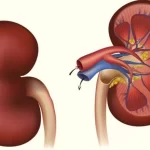Nephrotic Syndrome
Nephrotic syndrome is a common kidney disease. Protein deficiency in urine decreased protein content in the blood, high levels of cholesterol, and inflammation in the body are symptoms of nephrotic syndrome. Kidney nephrotic syndrome can cause inflammation in the body at any age, but this disease is mainly seen in children. With proper treatment, control of the nephrotic syndrome and subsequent re-swelling is characteristic of the nephrotic syndrome, lasting for years. The di is a worrying condition for the patient and his family members due to prolonged inflammation.
Effect on the kidney.
In simple language, it can be said that the kidney works as a filter in the body. By this, the body excretes unnecessary excreta and excess water through urine. In the disease, as the filter holes in the kidney enlarge, extra water and excretory substances, as well as proteins required by the body, are released along with urine. This reduces the amount of protein in the body and causes swelling in the body.
There is a decrease or increase in swelling in the patient’s body according to the amount of protein that goes into the urine. Even after inflammation in the nephrotic syndrome, the efficiency of the kidneys to remove unnecessary substances remains unchanged. That is, the chances of kidney failure are very less.
Causes of Nephrotic Syndrome
- No definite cause of this disease has been found. There is a belief that this disease occurs due to autoimmune disease deficiency in leukocytes. Changing diet or taking medicines as responsible for this disease is completely wrong. 90% of the patients of this disease are children in whom no definite cause of the disease is found. It is also called primary or idiopathic nephrotic syndrome.
- This disease is an important cause of recurrent inflammation in children.
- In the primary stage, it can be caused by four important pathologies. Minimal Change Disease (MCD), Focal Segmental Glomerulosclerosis (FSGS), Membranous Nephropathy, and Membranoproliferative Glomerulo Nephritis (MPGN). Primary nephrotic syndrome is a specialized diagnosis. Which is diagnosed only after the removal of secondary causes one after another.
- In less than 10% of cases, the disease can be caused by various diseases and causes in adults. Such as infection, loss due to any medicine, cancer, hereditary disease, diabetes, S. L. This syndrome may occur in E. and amyloidosis, etc.
- The most common cause of this disease in children is MCD ie Minimal Chain Disease. The disease occurs in the idiopathic (without cause) nephrotic syndrome in 35 percent of young children (up to the age of six) and 65% of cases in older children.
- Blood pressure remains normal in a patient with MCD (Minimal Change Disease), red blood cells, absent in urine, and serum creatinine and complement C3 / C4 values are normal. Of all the causes of this disease, MCD is the least serious disease. 90% of patients recover from steroid treatment.
Symptoms of Nephrotic Syndrome
- Nephrotic Syndrome disease mainly occurs in children between two and six years. The number of individuals of other ages appears to be much lower than in children.
- This disease usually starts after fever and cough.
- The typical symptoms of the onset of the disease are swelling under the eyes and on the face. Due to swelling in the eyes, many times patients first go to the eye doctor for examination.
- This swelling is more visible when the patient wakes up in the morning after sleeping, which is the hallmark of this disease. This swelling starts to decrease gradually as the day progresses and subsides completely by the evening.
- When this disease progresses, the stomach swells. The urine decreases, the whole body becomes swollen, and the weight increases.
- Many times there is a complaint of foamy appearance in the urine and white spots appear on the place where urine has been urinated.
- The nephrotic syndrome is more common in children between two and eight years of age.
- In this disease, there are no symptoms like red urine, breathlessness, or increased blood pressure.






